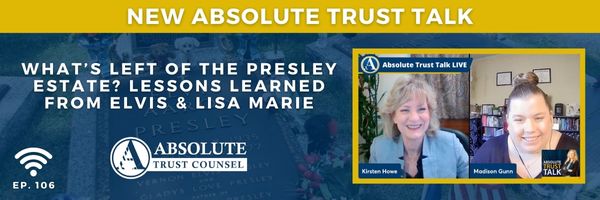You’ll find no shortage of captivating stories in the realm of estate planning. Tales of barely legible handwritten notes found in obscure places that detail a decedent’s wish to bequeath their fortune to someone they had only just met. Or accounts of family members becoming estranged and a child or other loved one is left out of the estate, which is then capped off with the ever-popular “no contest” clause threat.
Life is complex, and so are family dynamics. Some family relationships fray while others grow stronger, and it’s not surprising that these shifts are often memorialized in estate plans. But is it really possible to freeze a family member out of an estate and insert a “no contest” clause to safeguard from challenges? Does this provision truly hold up in the real world, or would a particular disinherited relative have any recourse if they find themselves in that position? And how does the clause change if an opportunist unduly influenced or preyed upon a decedent?
For the answers to these questions and more, tune into our latest episode of Absolute Trust Talk. Kirsten Howe will speak with trust and estate litigation attorney Jennifer Herlihy, founding partner of Walnut Creek-based Koller Herlihy, LLP. In addition to trust and estate litigation, Jennifer centers her practice on contested conservatorships, financial elder abuse actions, and related litigation, including civil claims and employment disputes with caregivers. Included in her impressive resume, Jennifer assisted more than 40 families in the highly publicized PG&E San Bruno explosion lawsuit and currently serves on the Tri-Valley Estate Planning Counsel and the Contra Costa County court-appointed attorney panel that represents conservatees in conservatorship proceedings.
In this episode, we’re going to discuss:
- What a “no contest” clause really entails and how rock-solid it is under the threat of litigation.
- The primary conditions that make a “no contest” clause effective in shielding an estate from litigation.
- The most common ways litigants seek to circumvent the “no contest” provision.
- The critical steps that anyone planning to leave an asymmetrical inheritance should take to help minimize the chances of a contest in the future.
- How ever-evolving technology has changed the nature of forgeries for “go-to” tactics of elder abusers and other opportunists.
And more.
You shouldn’t have to ask anyone’s permission to structure your estate as you see fit — even if you plan to leave a family member a disproportionately smaller amount of it. Our goal with this episode is to help you better understand the circumstances surrounding “no contest” litigation and ensure that your wishes in your estate plan are carried out as you intend them to be.
Big Three from Episode #103:
- In order for a “no contest” clause to have the likelihood of being effective, the amount of the gift connected to the clause must be significant enough to the recipient that they wouldn’t risk losing it if they did decide to contest the will or trust. This also means that the amount of the gift involved must be somewhat proportionate to the size of the estate — attaching a $10,000 gift to a “no-contest” clause might well be effective if the total estate is valued at $100,000, for example, but it isn’t likely to be much of a deterrent if the estate is valued in the millions. This is particularly true if the recipient is well off and doesn’t have to rely on the inheritance for their financial well-being.
- Family dynamics are often complex and can evolve over time. As a result, estrangements may occur that can have a profound effect on a future decedent’s estate plan, resulting in an asymmetrical inheritance — where one family member may receive a smaller portion of the estate. This situation, unfortunately, can lead the estranged family member to feel left out unfairly — circumstances that often lend themselves to litigation. If you find yourself in this situation, it’s vitally important to communicate your wishes clearly and as soon as possible to everyone involved. This is perhaps the single most effective means of avoiding litigation among your heirs in the future.
- While there are a number of ways a will or trust can be contested indirectly, if there is probable cause behind the contest, the clause is very unlikely to be invoked during litigation. This presents a potentially problematic scenario as “probable cause” itself is a somewhat nebulous term. And because most trust cases settle — as opposed to going to a judge’s ruling — there isn’t a lot of case law to be cited.
Time-stamped Show Notes:
0:00 Introduction
0:28 Kirsten shares some insights into why getting a litigator’s perspective is so useful for estate planners.
0:54 Jennifer has an extensive background in many types of litigation, including trust cases. Here are some details on her impressive background.
4:27 A “no contest” clause is a provision in a trust or a will that says essentially, if anyone contests this trust or will they get nothing. Listen in as Kirsten share’s more details.
5:08 Many clients feels as if they can’t file when they see a “no contest” which can leave clients feeling like they have no recourse.
5:33 Here are some characteristics of an effective “no contest” clause.
7:00 It’s also important to think about how a potential heir’s financial standing can play into “no contest” litigation – parents may leave a child less because they have a lot of money.
8:30 There are ways to initiate litigation that aren’t legally considered to be contests but have the same effect. Here are some examples.
10:05 Even the most stringent and well-constructed “no contest” clause won’t hold up if it is brought with probable cause.
11:23 On the other hand, some recent legal cases illustrate just how definitive a “no contest” clause can be. Here’s one example.
13:55 Wondering if a trust needs to be shielded from contests by more distant relatives? It truly depends on the circumstances – what prior documentation said and what it looks like now.
14:41 These actions lessen the chance that challenge-minded heirs will decide to cause legal trouble. The top of Jennifer’s list is to NOT shock someone – have a sit down with the heir and then follow up in writing so your wishes are preserved.
16:41 Next, Kirsten and Jennifer discuss altered documents – what forgery looks like today.
17:02 Ever-evolving technology has led to this strategy shift among opportunists seeking to circumvent the intentions of a will.
17:40 One error that Jennifer sees, is the emailing of estate documents without instructions about how to the content needs to be printed out and signed in front of a notary, which makes forgery a lot easier.
18:42 Jennifer shares some ways that both estate planners and their clients can make forgeries less likely to occur.
22:01 Undue influence is a major aspect of elder financial abuse. Here are some tips for preventing it from happening. Hint: It largely revolves around communication and recording that communication.
24:18 Q&A: Curious as to who pays legal fees if an unhappy beneficiary is unsuccessful in contesting a trust? Here’s what often happens.
25:36 Q&A: Do attorneys ever take trust contest cases on a contingency basis?
Get in Touch with Jennifer Herlihy:
Jennifer Herlihy
Attorney, Founding Partner
Koller Herlihy, LLP
1460 Maria Lane, Suite 360
Walnut Creek, CA 94596
W: (925) 915-8759
jherlihy@khtrustlaw.com
https://khtrustlaw.com
Resources/Links Mentioned in this Episode:
- Absolute Trust Talk Episode 101: What Does My Family Need to Know About My Estate Plan Before It’s Too Late?
- Absolute Trust Talk Episode 098: What Are the Top Ten (Plus) Estate Planning Myths?
- Absolute Trust Talk Episode 097: Estate Planning Lessons from the Rich and Famous
- Absolute Trust Talk Episode 090: Choosing a Trustee – How to Get it Right
- Absolute Trust Talk Episode 086: Trust Failures: Don’t Let This Happen to You!
- We’re pleased to provide you with a library of e-books to address common estate planning questions and concerns in practical, easy-to-understand language. https://AbsoluteTrustCounsel.com/Resources/.
- ASK KIRSTEN: If you’d like Kirsten to answer your question on the air, please email her at Info@AbsoluteTrustCounsel.com.
[AD] Are you a resident of Walnut Creek or the greater East Bay needing help with your estate plan? At Absolute Trust Counsel, your family’s safety is our number one priority. We understand how complicated it can be to know if you’re making the right legacy planning decisions, which is why we’re here to make things easier. Schedule a free discovery call, and let’s talk about how we can help build the right plan for you and your family.
[AD] The job of a trustee isn’t as easy as one may think. You must give legal notices, retitle assets, file tax returns, understand a legal document, and perform a variety of tasks most people find unfamiliar. As a trustee, if you forget a step or make a mistake, you could be held liable.
Protect yourself, have a plan, and find out the next steps about your specific trust. Get started now by scheduling a 20-minute discovery call with Absolute Trust Counsel. During this introductory call, we will gather information about your trust administration, review our trust administration process with you, and answer any questions you may have. Our goal is to help you get the job done right!


